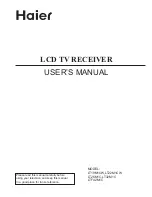
MEPS
−
Televisions April 2005
Page 17
A study produced for the Energy Efficiency and Conservation Authority by
Wise Analysis Ltd
6 Standards
Development
There are currently no national or international standards applying to the energy consumption
of TVs. A new joint standard, AS/NZS 62087:2004 that defines the methods of measurement
for the power consumption of audio, video and related equipment has recently been published.
This standard derives from international standard IEC 62087 and covers televisions, VCRs,
Set Top Boxes, audio equipment (separate components) and combination equipment (such as
integrated stereos).
The Australian government is also currently communicating with the relevant committees on
developing a standard that includes voluntary efficiency performance requirements for standby
energy consumption. These initial voluntary requirements would be published by SAI in a new
part of the AS/NZS 62301, which provides a test procedure to determine the power
consumption of a range of appliances in standby mode. The interim standard, which is identical
to the IEC draft TC59 WG/9 (IEC 62301) is a provisional Standard with the two year life
intended to provide a guide to the direction that future standardisation may take. By then it is
anticipated that the IEC standard will have been published and it is expected that this will be
subsequently adopted as the joint Australian/New Zealand standard.
7 Test
Laboratory
Capability
The need for local test laboratories to carry out tests on overseas manufactured TVs has not
been demonstrated. It is anticipated that contracts for purchase will include requirements for
type testing and possibly labelling. International TV suppliers have been testing to the IEC
62087 for a number of years, and the acceptance of international testing laboratory test results
should be acceptable in any proposed MEPS regime.
The ability of local Australasian testing laboratories to perform the tests in accordance with
AS62087 is also certainly feasible as the test equipment and methodology is not different from
standard testing requirements.
8
International Energy Efficiency Programs
8.1
Voluntary Programs
Various voluntary programs that address standby and in-use power consumption exist
internationally. The international ENERGY STAR Program is the only voluntary program that
operates in Australia and is recognized in New Zealand. It addresses standby power
consumption primarily of office equipment but not currently in-use consumption.
In Europe, there are a number of initiatives that target power consumption in televisions. The
Group for Energy Efficient Appliances (GEEA), which is made up of representatives from
European national energy agencies and government departments, encourages industry best
practice through a voluntary energy labelling scheme, which uses an Energy Efficiency Index
that takes into consideration energy consumption in-use. At least 20% of the analogue TVs
already on the market in Europe comply with this index.














































